• 311. Caroline to Wilhelm Schlegel in Berlin: Jena, 24 April 1801 [*]
Jena, [Friday] 24 April [1801]
|107| Behold the above date, my dear Schlegel. I have been here since yesterday evening. I received your letter while I was still in Braunschweig, and its contents certainly made my reflections during the journey rather gloomy. [1] Must you be plagued by such a simple-minded annoyance? Unger really does seem to have lost his senses. Because you have said nothing till now that would lead me to believe you suspected him, this whole thing has caught me quite by surprise. Although I hope this will not necessitate your going to Leipzig now, [2] since that would get in the way of your other plans, I do nonetheless long to see you here soon.
How it would have bolstered me to have found you here when I arrived. I have tried in every possible way to be strong, but these efforts have just consumed everything inside me, even the sad joy of seeing Schelling again. He looks quite bad, but is gentle and reasonable. I did not let him know of my arrival until this morning even though we arrived fairly early yesterday, around 7:00. I did have to send word to Friedrich because of some business matters. Madam Veit is in Leipzig. [3]
Friedrich wrote me the enclosed lines this morning. [4] I received him, he found Schelling here, who had just arrived shortly before. Everything was just fine for an indifferent conversation, we discussed the modum of Paul’s murder. [5] Although I gave him an opportunity to speak with me alone, or at least to say that he wished to do so, he did not take advantage of it, perhaps because he was not quite thinking clearly, for he was rather absent-minded and dreamy, quite peculiar in that way of his. [5a]
I can do nothing further now than keep quiet concerning the unexpected degree of neglect and squalor with regard to all the things I had quite certainly left behind utterly undamaged, [6] so also the recollection of Rose, as she assures me, whose otherwise gentle nature has become utterly furious, not least |108| because her biological sister also played such a trick on her, breaking open her suitcase and taking out a silk dress to use in a ceremony for standing as a godparent. [6a]
What a proper comedy it all is — I am making it such to avoid being annoyed, for it is indeed appalling. I will spare you the details. All the various utensils were carried to and fro whenever Madam Veit happened to need something. [7] A considerable number of pieces are simply missing entirely. You would laugh if you could see how Rose has gotten all heated up. [8]
I intend to gather up all the pieces and prepare the place for you; you can depend on my ridding myself of all “female” inclinations — but if you say again: “Put away all such pettiness” — I fear you yourself will be forced to acknowledge the seriousness of things with regard to the sheer loss. Since these “petty things” do belong to our departement, [9] it is not petty to pay attention to them. . . .
If I had time, my dearest friend, I did not intend even to mention it at all, but in all the haste and hurly-burly, it just came out of my quill. Let it go again, and just write and tell me how things stand with your Ungerian affairs. Please also transfer money to me soon, since we are frightfully low; I have already had to borrow a considerable amount from Luise.
I see that the booksellers are only just now departing for the book fair. So Tiek is only coming now and has not really been here yet. [10] Your mother wrote me; she had much to relate about Lottchen’s illness. Alas, my dear friend, it does not seem to me that the danger has passed. Do see her if at all possible. [11]
But do not stay away long; be kindly disposed to your friend, I intend to do everything I can to make your existence pleasant, am remaining quiet and calm now, and am hoping in you.
I find I am extremely fatigued, mostly because of worrying and having so many things to take care of; my head is quite spinning from it all, so please forgive this disorganized letter, since I did really want to get it written today.
|109| Luise visited the Hufelands this morning and was quite cordially received [12] — they will be going to Weimar for a time, and Geheimrath Voigt to Petersburg. [13] Entre nous, [14] His Excellency is acting a bit crazy. [15] It looks that way here as well, quite empty.
But it will be a beautiful spring, and many of the walking paths are already getting covered with greenery where you can write your poetry for Tristan. [16]
I cannot find Rose’s inventory anywhere in your writing desk. [17] Where could it be? She put up a new one today for comparison. I have the key to your desk because there was laundry underneath, and will keep it, since it cannot be in safer hands — is that not correct?
Emma is running around all over the place and sends her regards. [18] All of us are longing for you. Stay well, very well indeed.
Notes
[*] Caroline had not been back to their apartment in Jena since 5 May 1800, when she and Auguste left for Bamberg and Bocklet, from which Auguste never returned. All of Auguste’s personal belongings, of course, were still in the apartment, not to mention the memories that surely overwhelmed Caroline when she first entered the premises again. Back.
[1] See Wilhelm’s letter to Caroline on 18 April 1801 (letter 309), in which he reveals the problems he was having with Johann Friedrich Unger and the remaining volumes in the edition of Shakespeare. Caroline had left Braunschweig on 21 April 1801 (Rudolf Koch and Fritz Kredel, Deutschland und angrenzende Gebiete [Leipzig 1937]):
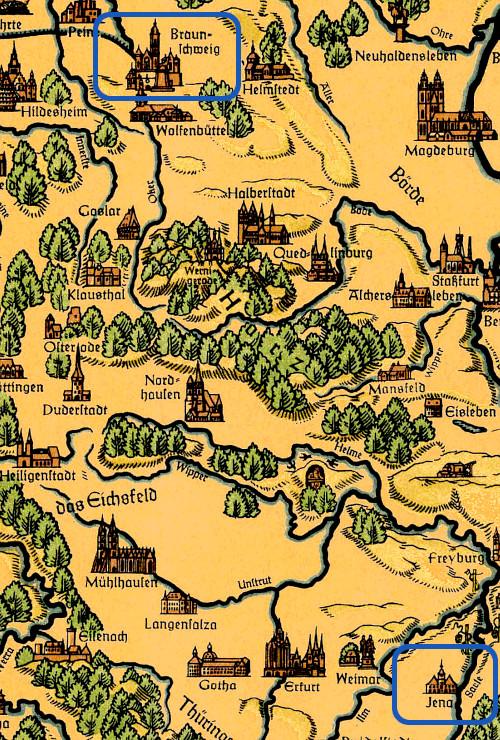
[2] To the Leipzig book fair to sound out possible publishers for the Shakespeare edition (Rudolf Koch and Fritz Kredel, Deutschland und angrenzende Gebiete [Leipzig 1937]):
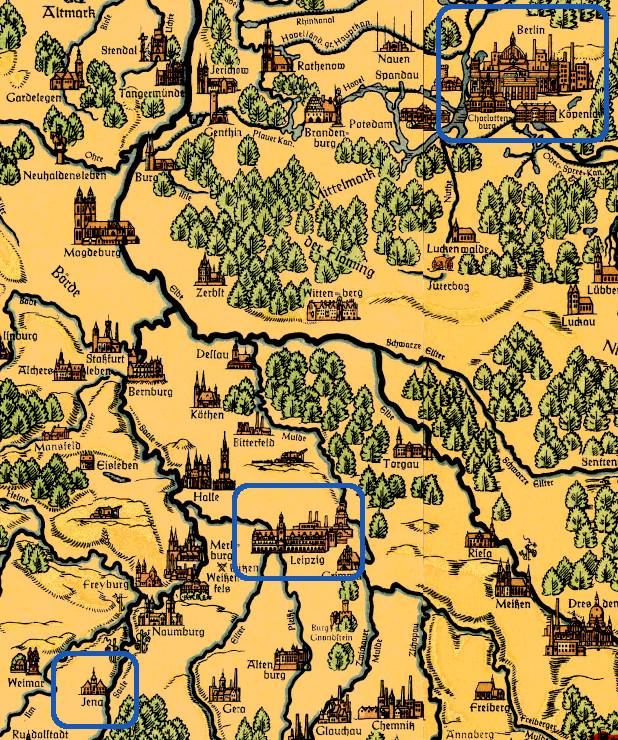
[3] Dorothea was in Leipzig to have new teeth made (Daniel Nikolaus Chodowiecki, Chirurgiesche Operationen [1789]; Herzog Anton Ulrich-Museum; Museums./Signatur DChodowiecki AB 3.822):

See Caroline’s letter to Wilhelm on 5–6 March 1801 (letter 296), note 31. In her letter to Wilhelm on 31 May 1801 (letter 319), Caroline remarks that Johann Diederich Gries had related to her that Dorothea had lost all her teeth and wanted to have new ones put in while she and Friedrich were in Leipzig. Back.
[4] Friedrich’s billet to Caroline on Friday, 24 April 1801 (letter 311b) using the formal form of address, Sie. See, however, Caroline’s letter to Wilhelm three days later, on 27 April 1801 (letter 312), in which she remarks that “Friedrich has not been coming to visit me, and I can certainly understand why,” namely, the discomfort associated with the initial visit, which Friedrich himself, in his letter to Wilhelm also on 27 April 1801 (letter 312a), describes as “so frosty that I doubt I will repeat it any time soon.”
See generally Friedrich’s lengthy, undated letter to Schleiermacher before mid-September 1801 (letter 328j) for his description of the sundered relationship between him and Caroline. Back.
[5] Latin, “manner,” i.e., of Paul I’s assassination the previous month. See the brief account in James Bell, A System of Geography, Popular and Scientific: Or A Physical, Political, and Statistical Account of the World and its Various Divisions, vol. 1 (Glasgow 1832), 30, in the chapter “Europe”:
The defeat of his [Paul’s] arms, the taking possession of Malta by the English, and the bad understanding which subsisted between his generals and those of Austria [see Caroline’s letter to Auguste on 16 September 1799 (letter 244), note 6], had a great effect on the emperor’s mind, while the powerful hand with which Bonaparte, on his return from Egypt, swayed the consular dignity, filled him with admiration.
Alarmed by the proceedings of the English government, he laid an embargo on their vessels on the 29th of August, 1800; and in November following became the leader of the Northern Neutrality, which at his invitation was joined by Sweden, Denmark, and Prussia [see supplementary appendix 310.a]. The coldness which he had evinced towards the latter power on account of its declining to join in the coalition against France, now gave way; and the ancient alliance between the two States was renewed in September, 1800.
Paul had now entered into direct correspondence with the First Consul; 7000 Russian prisoners had been returned from Paris without ransom, and the treaty of Luneville just concluded [9 February 1801], when he was assassinated on the night of the 23d March, 1801, at the moment when the British fleet were sailing through the Sound to break the Northern League [Battle of Copenhagen].
The harshness with which Paul treated his nobles excited this conspiracy, in which his own sons joined, being persuaded that their father was intending to clap them into a fortress. Prince Alexander is said to have stipulated with the conspirators that his father’s life should not be taken, and that on his returning to sanity he should be again reinstated in the office and dignity of emperor.
The principal conspirators were three of the Subof family, and the generals Bennigsen, Ouvarof, and Pahlen. They entered the royal apartments about eleven o’clock in the evening of the 23d March, despatched the sentinel, passed into Paul’s bed-room, and on meeting with resistance from the emperor, who tried to defend himself with a sword, threw him to the ground, and strangled him with a sash.
(“Mort tragique de Paul 1er,” M. A. Thiers, Histoire du consulat e de l’empire, vol. 2 [Paris 1847], plate following p. 432):
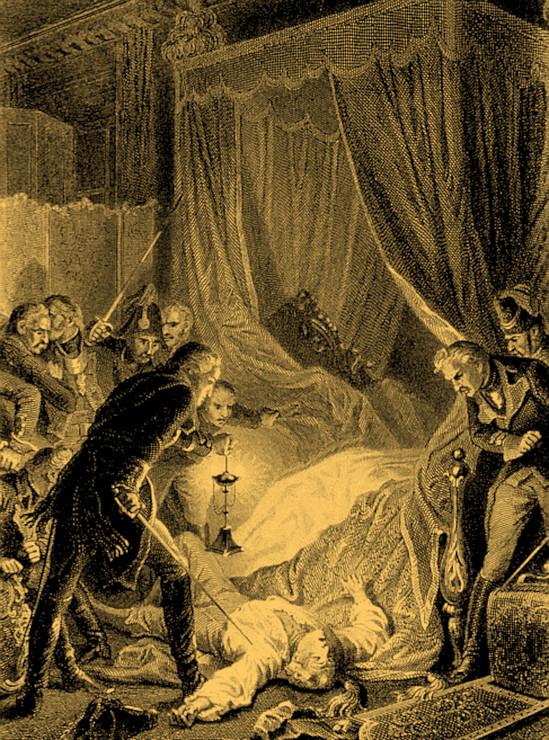
[Author’s footnote] Dr. Lyall, an excellent authority, has thus described this remarkable assassination, and the circumstances by which it was attended: —
Agreeably to a revelation made to him in a dream, or in a vision, Paul had built the palace of St. Michael; an immense quadrangular pile at the bottom of the summer-gardens, moated round, and fortified with bastions of granite; and there, as in a fortified castle, and secure from danger, the Emperor, with his family, took up his residence.
His Majesty, however, seems to have had some presentiment of his approaching fate; and had even ordered a secret staircase to be constructed, which led from his own chambers to the terrace; but, in the hour of danger, he was unable to take advantage of this exit.
Late on the evening of the 11th, or early on the morning of the 12th of March, 1801, (O. S. [O.S. or “Old Style” date, indicating the old Julian Calendar, as opposed to “N.S.” (new style) indicating the current Gregorian Calendar]) Paul was assailed by a band of conspirators; and, after unavailing threats, succeeded by entreaties and promises, and a noble resistance, his Majesty was strangled by means of a sash, one end of which was held by Zubof, while a young Hanoverian drew the other, till their victim expired.
As if they had been attending a banquet, the assassins retired from the palace without the least molestation, and returned to their respective homes. Medical aid was called, in the hope of restoring suspended animation, but Paul had paid the debt of nature, and a few days afterwards his body was embalmed by Sir James Wylie, one of the lucky individuals whose fortune was made by his Imperial Master’s whims.
It almost seems an anomaly in history, that the murderers of Peter III. became the avowed favourites or the protegés of Catherine II; and it is scarcely less remarkable, that the mercy of Alexander was extended to the assassins of his father. Back.
[5a] Zeitvertreibs Kalender in vermischten Unterhaltungen für Gesellschaften (Vienna 1801):

[6] See Friedrich’s account of this initial meeting and of the missing or damaged household utensils in his letter to Wilhelm on 27 April 1801 (letter 312a) ([1] Martin Engelbrecht; Augsburg, Städtische Kunstsammlung; [2] Anonymous, “Küche” [19th century]):
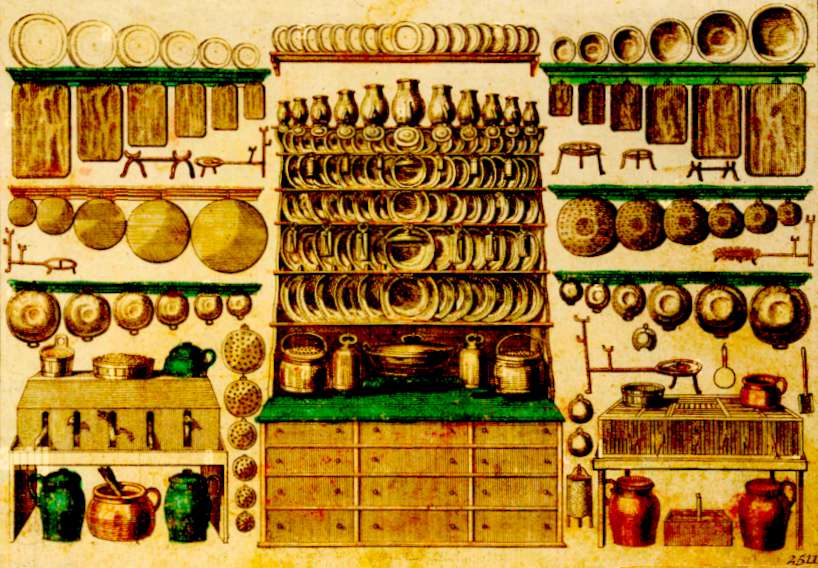
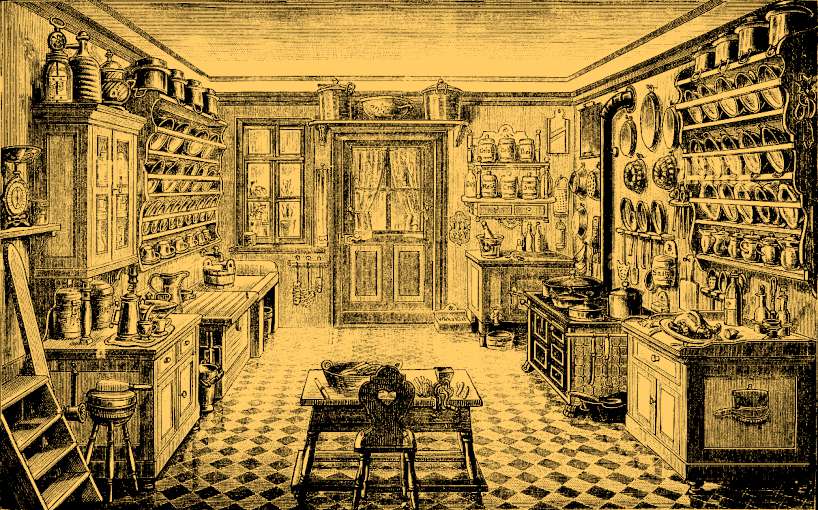
The latter issue now represents an ongoing point of contention, so much so that Dorothea eventually felt compelled to defend herself — heatedly — to Wilhelm even after Caroline’s death, writing to him concerning precisely these issues from Vienna on 16 January 1810 (letter 453a). Back.
[6a] Here contemporary renderings of infant baptism at home with family members and godparents (left) by Daniel Nikolaus Chodowiecki, Eintritt in die Welt ([1797]; Herzog August Bibliothek; Museums./Signatur Graph. A1: 437) and (right) from Elisa oder das weib wie es sein sollte, 3rd ed. (Leipzig 1798):

[7] I.e., to and fro from the apartment at Leutragasse 5 and Friedrich and Dorothea’s new apartment and, presumably, to the unidentified later one. Back.
[8] Louis Michel Halbou after Freudenberger, Zornige Frau mit zwei Herren (ca. 1780) (from A. W. Ifflands dramatische Werke [Leipzig 1798–1802]):

Caroline uses the German idiom sich eräschern, here rendered as “get heated up.” Erich Schmidt, (1913), 2:610, explains the idiom as well as its variant sich abäschern as meaning “to make one(self) breathless, to take away one’s breath.” Provinzialwörter: deutsche Idiotismensammlungen des 18. Jahrhunderts, ed. Walter Haas and W. Günther Ganswer (Berlin 1994), 407, 417, points out that the idiom can mean not only “move about so vehemently that one sweats,” but also “allow oneself to get very angry,” parallel to the meaning of French s’échauffer, which itself passed into German as sich echauffiren, “to grow warm, overheat oneself,” as well as “to grow angry, to chafe, to fume,” similar to German sich erhitzen. Back.
[9] In French in original. Back.
[10] See Ludwig Tieck’s letters to Wilhelm on ca. 21 April 1801 (letter 310a) and to Friedrich on 23 April 1801 (letter 310b) for his explanation about why he had postponed his trip for the time being; the trip never materialized in any case. Back.
[11] Although Erich Schmidt, (1913), 2:610, identifies “Lottchen” here as “the granddaughter Lottchen Dieterich, the reference seems more likely to be to Charlotte Ernst, whose illness has been mentioned in several recent letters; see esp. Caroline’s letter to Wilhelm on 14 April 1801 (letter 307), in which she writes the following:
May God preserve Charlotte’s life! Be sure to visit her even if it means I might be seeing you later. I will write to your mother.
See also Ludwig Tieck’s letters to Wilhelm on ca. 21 April 1801 (letter 310a) and to Friedrich on 23 April 1801 (letter 310b), in both of which he reports Charlotte’s recovery, which Caroline is here calling into question. Back.
[12] Madam Hufeland was Luise’s sister-in-law, but Caroline and Wilhelm had not been on good terms with the Hufelands since Wilhelm’s (and Schelling’s) break with the Allgemeine Literatur-Zeitung back in the summer and autumn of 1799. The Hufelands lived across the rear courtyard from the Schlegels at Leutragasse 5. Here a view of the Hufelands’ apartment (on the right) on an early twentienth-century postcard (courtesy Martin Reulecke):

Here, from essentially the same camera position, the entry to the apartments on the opposite (right) side of the courtyard along with the windows (left) to Caroline’s apartment (photo: Stadtmuseum Jena):
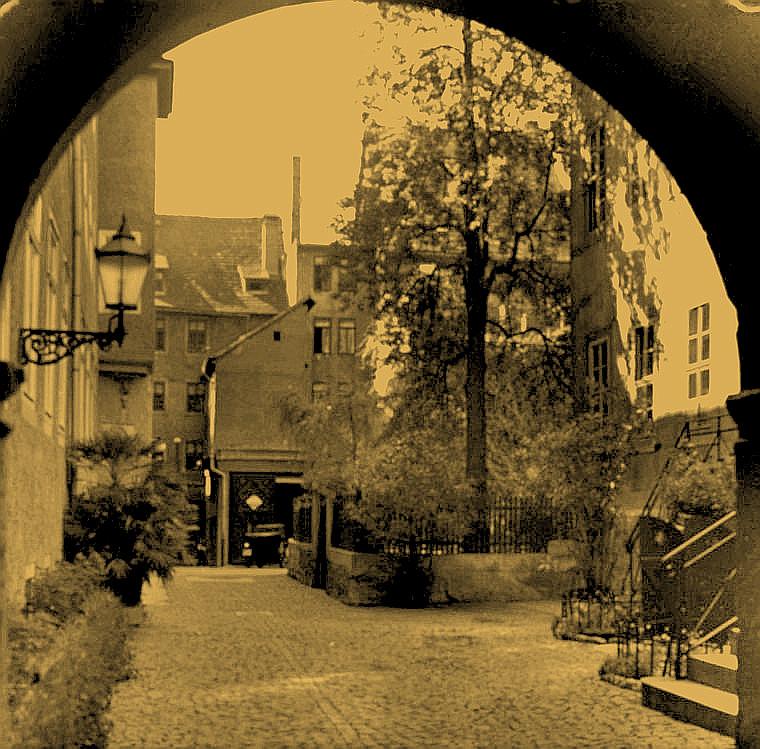
[13] To arrange the marriage pact between Grand Duchess Maria Pavlovna of Russia and Duke Karl August’s son, Karl Friedrich. Back.
[14] Fr., “between us.” Back.
[15] Concerning Duke Karl August’s recent “ugly adventure” (so Caroline) in Berlin, which involved the sister of his potential daughter-in-law (see above), see Caroline’s letter to Wilhelm on 20 April 1801 (letter 310), note 15. Back.
[16] See August Jäger von Schlumb, Felix Schnabels Universitätsjahren oder Der deutsche Student. Ein Beitrag zur Sittengeschichte des neunzehnten Jahrhunderts (Stuttgart 1835), ed. Otto Julius Bierbaum (Berlin 1907), 238–40 (illustration: Jena from the northwest, ca. 1840, by Eduard Lobe; Bildrechte/-herkunft: Sammlung Jenaer Stadtansichten [Stadtmuseum Jena 13011]):
And it is indeed true: during the summer it is absolutely beautiful in Jena! The surrounding areas are charming, the change of scenery between mountains and valleys and forests and streams is unique, taking walks is an extremely pleasant pastime, and the villages and inns are all nearby and inviting even from afar!

Here a view of the Saw Mill along the Saale River ca. 1780 by Christian Gotthilf Immanuel Oehme (Dresden, Sächsische Landesbibliothek – Staats- und Universitätsbibliothek [SLUB], Kartensammlung, Signatur/Inventar-Nr.: SLUB/KS B2446):

Here the view of Kunitz up the Saale River in a contemporary illustration by Christian Gotthilf Immanuel Oehme, Beÿ Cuniz (ca. 1780), Sächsische Landesbibliothek, Staats- und Universitätsbibliothek Dresden:

See also Dorothea Veit’s description of the Jena spring in her letter to a Rahel Levin on 28 April 1800 (letter 259l).
Concerning Wilhelm’s unfinished poem “Tristan,” see Caroline’s letter to Schelling on 2 January 1801 (letter 279), note 6, with cross references. Back.
[17] I.e., inventory of items Caroline had left behind in the house. Back.
[18] Daniel Nikolaus Chodowiecki, “Die meisten Arten der Nahrungsmittel,” Kupfersammlung zu J[ohann] B[ernhard] Basedows Elementarwerke für die Jugend und ihre Freunde: Erste Lieferung in 53 Tafeln. Zweyte Lieferung in 47 Tafeln von L bis XCVI (Leipzig, Dessau, Berlin 1774), plate I:

Translation © 2015 Doug Stott
